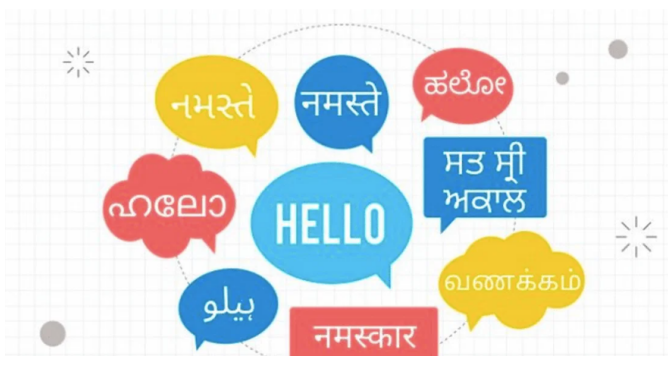- Courses
- GS Full Course 1 Year
- GS Full Course 2 Year
- GS Full Course 3 Year
- GS Full Course Till Selection
- MEP (Mains Enrichment Programme) Data, Facts
- Essay Target – 150+ Marks
- Online Program
- GS Recorded Course
- NCERT- First Ladder
- Polity
- Geography
- Economy
- Ancient, Medieval and Art & Culture AMAC
- Modern India, Post Independence & World History
- Environment
- Governance
- Science & Technology
- International Relations and Internal Security
- Disaster Management
- Ethics
- Current Affairs
- Indian Society and Social Issue
- CSAT
- 5 LAYERED ARJUNA Mentorship
- Public Administration Optional
- ABOUT US
- OUR TOPPERS
- TEST SERIES
- FREE STUDY MATERIAL
- VIDEOS
- CONTACT US
Multilingualism in India
Multilingualism in India
01-11-2023

Why in News?
In today's scenario, multilingualism has garnered increasing recognition for its multifaceted significance. This includes not only its cognitive advantages but also its potential to enrich diverse cultures.
India’s Multilingual Scenario
-
Multilingual Landscape:
- India is a globally diverse country with over 19,500 languages spoken throughout the nation.
- Indians have a unique opportunity to be multilingual, enabling them to use multiple languages in communication.
- The 2011 Census of India revealed that over 25% of the population speaks two languages, while approximately 7% speaks three languages.
- Studies reveal that young Indians are more multilingual than their elder generation, with approximately half of the urban population aged 15 to 49 speaking two languages.
-
Contribution of Multilingualism to India’s Diversity:
- India's multilingualism is not just a matter of numbers, but also a reflection of its culture, identity, and history.
- India's diverse and pluralistic society is reflected in its languages, which reflect the coexistence and interaction of people from various religions, ethnicities, castes, and classes.
-
Benefits of Multilingualism:
- Multilingualism has been shown to enhance cognitive abilities like memory, attention, problem-solving, and creativity.
- Research indicates that bilinguals and multilinguals possess superior executive functions, which are responsible for planning, organizing, and controlling mental processes.
- Multilingualism enhances social and emotional skills like empathy, perspective-taking, and intercultural competence.
- Learning diverse languages allows individuals to comprehend and appreciate diverse cultures, values, and worldviews, thereby enriching their understanding and appreciation of the world.
- Multilingualism offers numerous practical benefits, including career advancements, travel experiences, and enhanced access to information and entertainment.
- Multilingualism enables communication, exploration, and access to diverse resources.
Constitutional
- Article 29: The law safeguards the rights of minorities and ensures that all citizens have the right to maintain their unique language, script, or culture.
- Eighth Schedule: The Indian constitution, specifically Part XVII, outlines the official languages of the republic, as outlined in Articles 343 to 351.
- The Eighth Schedule of the Indian Constitution acknowledges 22 official languages:
- Assamese, Bengali, Gujarati, Hindi, Kannada, Kashmiri, Konkani, Malayalam, Manipuri, Marathi, Nepali, Oriya, Punjabi,Sanskrit, Sindhi, Tamil, Telugu, Urdu, Bodo, Santhali, Maithili and Dogri.
- The Eighth Schedule of the Constitution lists all Classical Languages.
- Six Indian languages currently have 'Classical' status listed in the Eighth Schedule of the Constitution.
- Article 343: The Union government's official language is Hindi in Devanagari script, and numerals should follow the international form of Indian numerals.
- The article stipulates that English will remain the official language for 15 years from the commencement of the Constitution.
- Article 345: The legislature of a state can legally adopt any of the existing languages or Hindi for official purposes.
- Article 346: The Act acknowledges India's linguistic diversity by enabling the use of multiple languages in official communications and facilitating efficient communication between states and the Union.
- Article 347: The President can recognize a language as an official language of a state if a significant portion of the state desires it, either for part or the entire state.
- Article 348(1): The text stipulates that all Supreme Court and High Court proceedings must be conducted in English language, unless a law mandates otherwise.
- Article 348(2): The Governor of a state can, with the President's consent, use Hindi or any other official language in High Court proceedings, despite Article 348(1) provisions.
- Article 350: Individuals have the right to represent their grievances to Union or State authorities in any language used in the Union or State.
- Article 350A of the Indian Constitution mandates that every state must offer primary education in its mother tongue.
- Article 350B allows for the appointment of a "Special Officer" for linguistic minorities.
- Article 351: The union government is granted the authority to issue a directive for the advancement of the Hindi language.



